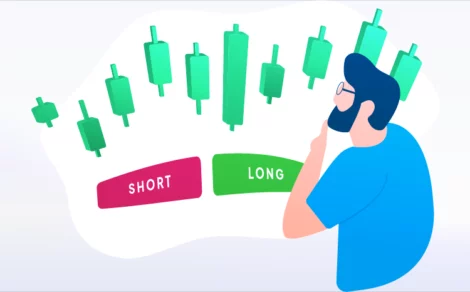Online trading has enabled investors to invest in financial markets easily, providing convenience, rapidity, and accessibility. As a beginner or expert, knowing how to start trading online is fundamental to earn profit from the stock market. From picking the right brokerage firm to ensuring safety from risk, online trading can lead you to buying and selling shares effectively. In this guide, we will help you understand the basics of online trading, its advantages, mistakes to avoid and risks involved.
What is the Process to Start Online Trading?
Starting an online trading in India involves having a systematic plan to invest in the financial markets. Here is a step-by-step guide to help you in the process:
1. Understand Online Trading
Online trading involves purchasing and selling financial products like stocks, bonds, mutual funds, and commodities on internet-based platforms. The process has made investment easier, and you can easily handle your portfolio.
Select the Right Stockbroker
To learn how to start online share trading, begin by researching brokerage platforms, understanding market basics, and practicing with a demo account before investing real money. Moreover, when selecting a broker, look for charges for opening an account, maintenance fees, brokerage fees, ease of using the platform and customer support. A good broker provides both Demat and trading accounts:
- Demat Account: This holds the securities you bought in an electronic form.
- Trading Account: It allows you to buy and sell securities in the stock market.
3. Opening Demat and Trading Accounts
Once you select a broker, the next step is to open a Demat account and a trading account to enable online trading. Opening an account is easy and typically involves submitting an online application form, providing the necessary documents (PAN card, Aadhaar card, etc.), and completing the Know Your Customer (KYC) verification. Moreover, almost all brokers provide a hassle-free and paperless account opening process within minutes.
4. Fund Your Trading Account
After your trading and Demat accounts are activated, you must transfer funds to your trading account through your bank account. These funds will help you buy and sell orders in the stock market. Most brokers offer multiple payment options like net banking, UPI, NEFT, RTGS, and debit cards to facilitate secure and easy transactions. So, you can begin with less capital and increase your risk appetite according to your experience.
5. Educate Yourself on Market Fundamentals
Before taking your first trade, a strong foundation of stock market fundamentals is necessary to make informed investment decisions. Some of the fundamental concepts include market dynamics, trading terminology and analytical methods.
Most brokers offer educational material, tutorials, and demo trading accounts to assist new entrants in understanding these fundamentals effectively. After all, an informed trader stands a better chance of doing well in the highly erratic stock market.
6. Start Trading
You can trade on the stock market once you have adequate knowledge and funds. The steps begin with studying stocks through the broker’s interface and reviewing stock information, price history, and financial statements. After selecting a stock, you can order by choosing the quantity and price at which you want to buy or sell the stock.
Orders can be traded as market orders, limit orders, or stop-loss orders based on your trading strategy. In addition, following trade execution, it is important to observe your investments regularly, check market trends, and optimise your portfolio in response. However, observing your portfolio performance helps improve future trade decisions.
Benefits of Online Trading
Learning how to start online trading in India can be beneficial for enthusiastic investors. Here are the different benefits of online trading:
-
Real-Time Trading
One of the major advantages of online trading is the real-time execution of trades. Investors have access to real-time market movement and instantly place buy or sell orders. Hence, this allows traders to take advantage of opportunities as they present themselves, maximising their investment approach.
-
Cost-Effectiveness
Traditional trading methods usually include a higher brokerage cost and commission. However, online trading websites normally charge affordable rates, minimising transaction costs. Some websites offer zero brokerage plans where investors can retain the maximum profit by keeping costs low.
-
Instant Access to Market Data
Online trading websites provide investors with an abundance of information, ranging from technical graphs to research publications and real-time figures. Furthermore, immediate access to the full range of market data facilitates traders to take informed decisions, maximising the scope for successful returns.
-
Flexibility and Convenience
The digital nature of online trading means investors can control their portfolios from any location at any time. Moreover, traders can track and change their investments wherever they use a computer, tablet or smartphone.
-
Increased Control Over Transactions
Online trading websites provide investors with direct access to their transactions. Such independence allows traders to make orders quickly, create customised investment objectives, and change their approaches without middleman lag. Therefore, it allows them to have a more aggressive investment style.
-
All-Inclusive Portfolio Management
With online trading, investors can easily monitor and oversee their whole investment portfolio under one roof. This single point of management makes it easier to monitor performance, rebalance holdings, and make informed decisions, leading to better portfolio management.
-
Responsive Customer Support
Professional online trading platforms offer instant customer support to help investors with technical problems, account information, or questions related to trading. This easily accessible help maintains a problem-free trading experience and aids in solving issues effectively.
Understanding Stock Trading for Beginners
Wondering how to start online trading in India? Understanding stock trading is fundamental for newcomers seeking to access the financial markets. Online stock trading means buying and selling shares in listed companies for profit. By investing in a stock, you essentially buy a part of the ownership stake in a company for which you become entitled to some percentage of the profits and assets of the firm.
The stock market acts as a forum for transactions to take place, allowing for the interaction between buyers and sellers. In India, the main stock exchanges are the Bombay Stock Exchange (BSE) and the National Stock Exchange (NSE). Firms list their stocks on these exchanges to arrange funds, and investors exchange these stocks based on their market price, which changes depending on the company’s performance, economic factors, and market sentiment.
To start trading, an investor needs to open a Demat account, where shares are held electronically, and a trading account, where buying and selling are done. These accounts can be opened with registered stockbrokers. Beginners need to learn important stock market terminology, like ‘bull market’ (time when stock prices are increasing) and ‘bear market’ (time when stock prices are decreasing), to make informed decisions.
Mistakes to Avoid in Online Trading
Traders can develop a structured approach and improve their chances of success in online trading. They need to avoid the following mistakes in online trading:
1. Trading Without a Well-Defined Investment Objective
Most beginners venture into the stock market with no clearly defined objective, only going by trends. Traders tend to make spontaneous decisions in the absence of a well-defined investment strategy, which results in confusion and loss. So, having financial objectives aids in choosing the correct stocks and trading methods.
2. Chasing Profits
Patience is one of the key factors when it comes to online trading. Most traders commit the error of acting in haste to gain profits quickly without comprehending market trends. Trading demands research, time, and effort. Those who concentrate solely on short-term gains tend to have a higher risk appetite.
3. Trading Based on Recommendations
Relying solely on advice from others without conducting personal research can be dangerous. Every trader has unique financial goals, risk tolerance and investment strategies. What works for one investor may not work for another. Hence, it is crucial to analyse stocks and market trends independently.
4. Letting Emotions Drive Decisions
Emotions such as overconfidence following a successful transaction or fear during a falling market can result in bad choices. Overconfidence might prompt traders to take unnecessary risks, while panic selling can result in losses. Discipline and adherence to a well-studied plan are necessary.
5. Disregarding Stop-Loss Orders
A stop-loss order sells a stock automatically at a specified price to cap losses. Most traders overlook this facility, expecting the price to recover, and end up making huge losses. Stop-loss limits reduce risks.
6. Insufficient Portfolio Diversification
Placing all funds in one stock or industry raises risk. A diversified portfolio, distributed across industries, can shield against market fluctuations and minimise overall losses.
7. Misuse of Leverage
Leverage enables one to invest in more than one’s actual funds, but it is a two-sided coin. Though it will expand the gain, it can also extend losses. The use of too much leverage without recognising its downside may lead to big financial losses.
Risks Involved in Trend Trading
Any kind of trading is risky for an investor. Here are the risks involved in trend trading:
- Not Placing a Stop-Loss Order: Traders lose a lot of money if the trend reverses suddenly without a stop-loss order. Having a tight stop-loss reduces potential loss.
- Staying Too Long in a Losing Position: Staying in a losing position hoping for a reversal may result in larger losses. Trend traders need to get out quickly when the market is against them.
- Bad Risk-Reward Ratio: A risk-reward ratio less than 1:2 diminishes long-term profitability. A good ratio ensures consistent gains.
- Inadequate Scaling: Increases too much into a position at the wrong time and risks too much. Scaling in first and scaling out at subsequent times is a better approach.
Final Thoughts
Overall, online trading presents wonderful opportunities but needs proper planning, research, and risk management. Traders can enhance their chances by avoiding common errors, diversifying their investments, and applying stop-loss measures. Discipline and staying updated are the secrets to making profitable stock market decisions. Be it a beginner or a seasoned trader, understanding how to start online trading is essential.
So, are you ready to begin your trading experience? Open a Trading Account with Torus Digital today!








